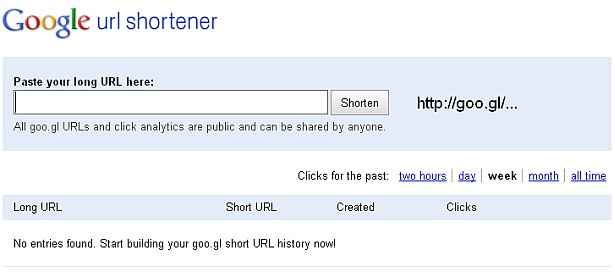Google gives Google URL Shortener a home at Goo.gl, enhances offering


While Google launched its own URL shortening service quite a while back, it has finally given it its own website, namely, http://goo.gl. So while you can now access the Google URL shortener much more easily, without resorting to the Google Toolbar or Feedburner, Google also says they have improved the service in many ways. Here’s how, in Google’s words:
There are many shorteners out there with great features, so some people may wonder whether the world really needs yet another. As we said late last year, we built goo.gl with a focus on quality. With goo.gl, every time you shorten a URL, you know it will work, it will work fast, and it will keep working. You also know that when you click a goo.gl shortened URL, you’re protected against malware, phishing and spam using the same industry-leading technology we use in search and other products. Since our initial release, we’ve continued to invest in the core quality of the service:
Stability: We’ve had near 100% uptime since our initial launch, and we’ve worked behind the scenes to make goo.gl even stabler and more robust
Security: We’ve added automatic spam detection based on the same type of filtering technology we use in Gmail
Speed: We’ve more than doubled our speed in just over nine months

Also, you will be able to create QR (quick response) codes very, very easily, by simply adding “.qr” to the end of the shortened URL that’s generated by Goo.gl. This is obviously a nod in the direction of mobile apps that can scan QR codes, and Google has used them in the past for the installation of Android apps.
Other features of the URL shortener include the ability to view a list of your shortened URLs when you log in via your Google account, and, various analytics about those links.
[RELATED_ARTICLE]Google says it will release the API to the service soon to allow developers to give users of their applications the ability to shorten/expand URLs, as well as view analytics, directly. It is already available as an extension for Chrome and Firefox. The move comes soon after Twitter launched its own URL shortening service.
